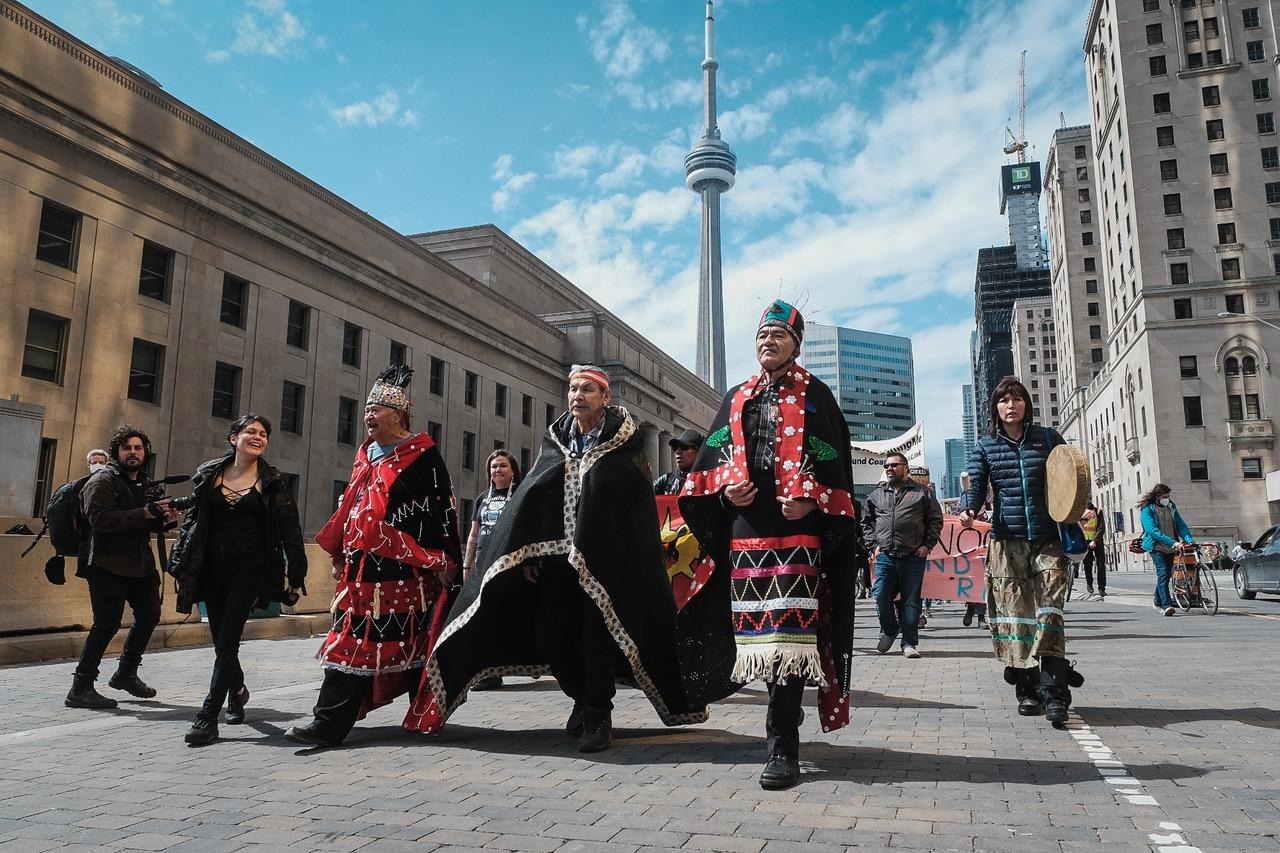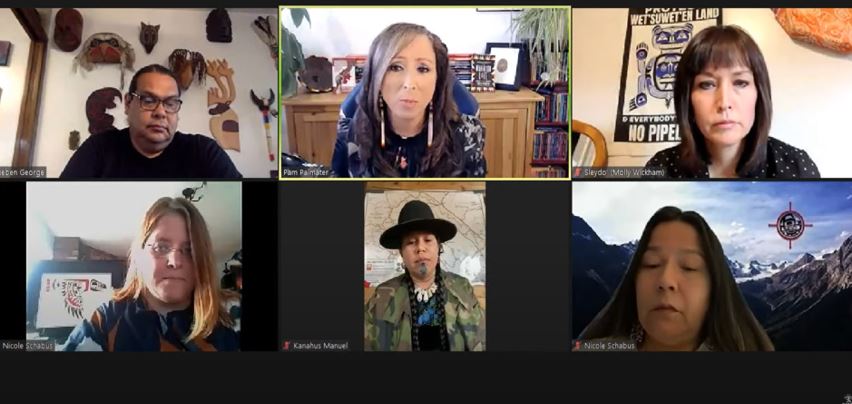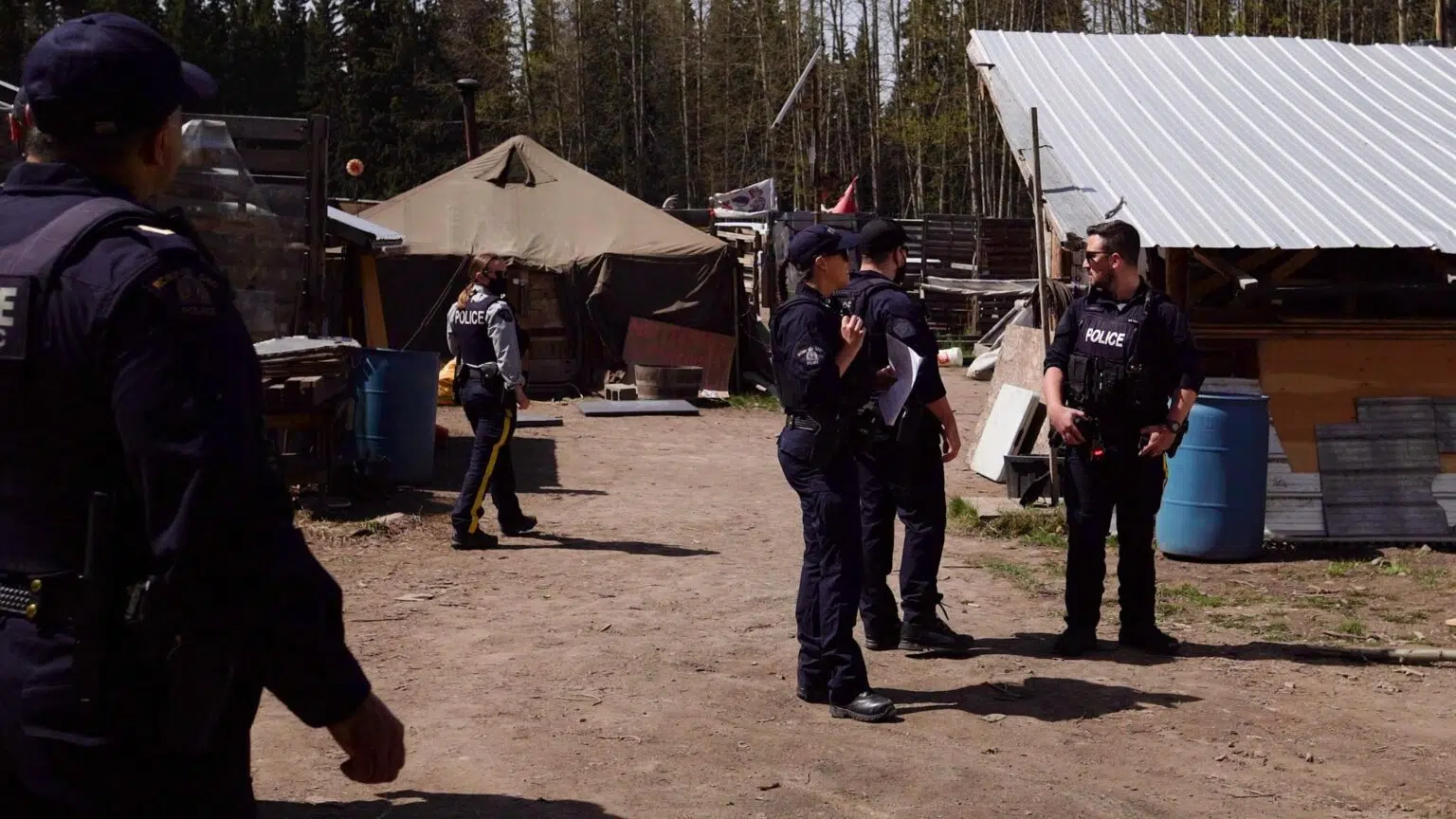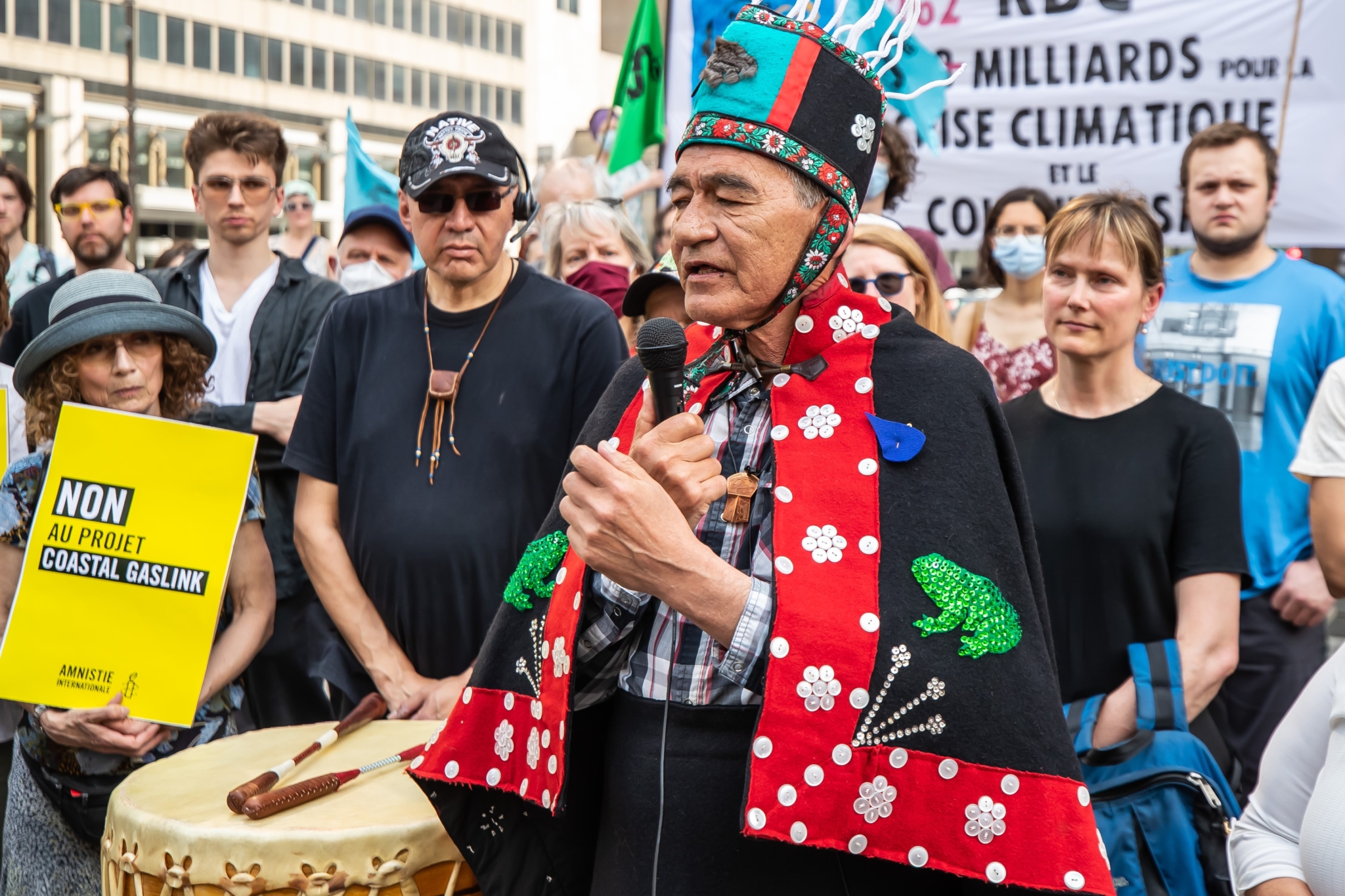
Wet’suwet’en land defenders say they expect work on the Coastal GasLink pipeline to resume in the next few weeks and fear they will face further arrests and human rights violations if the RCMP enforce an injunction to remove people from the construction site. Wet’suwet’en hereditary chiefs say that drilling under Wedzin Kwa – or Morice River- will harm the river, an important source of drinking water on the territory and crucial habitat for wild salmon. They unanimously oppose the pipeline and have called on Canada to stop construction and withdraw RCMP and security forces from their territory.
Canada: Indigenous Land Defenders at Risk
urgent action appeal
Please immediately send an Urgent Action to federal Public Safety Minister, Mark Mendicino
UN Committee Expresses Concern
On April 29, the UN Committee for the Elimination of Racial Discrimination (CERD) issued a third letter to Canada expressing alarm over Canada’s failures to respect the rights of Indigenous peoples who oppose the construction of two fossil fuel pipelines in British Columbia – the TransMountain pipeline expansion and the Coastal GasLink pipeline.
The letter states the Committee’s ‘profound regret’ that despite two earlier letters from the UN body recommending that Canada withdraw police and security forces and suspend construction on the Coastal GasLink and TransMountain pipelines, the intimidation, use of force, surveillance and criminalization of land defenders has in fact escalated. The Committee noted concern that the situation could further deteriorate, resulting in violations of the rights of Wet’suwet’en and Secwepemc people to their rights and territories, the right to be consulted and the right to security of the person.
Canada became a party to the International Convention on the Elimination of All Forms of Racial Discrimination in October 1970 and is required to uphold the Convention under international law.
Watch the joint press conference with land defenders on May 11.

When I read the third letter from CERD, I felt overwhelmed by the recognition that our experiences are violations of international human rights and Indigenous rights. The construction of the Coastal GasLink pipeline project, and the RCMP’s treatment of me and other land offenders is a violation of our humanity as Indigenous peoples
Sleydo’, spokesperson for Gidimt’en Checkpoint
The Committee called on Canada to:
- Cease construction of the TransMountain and Coastal GasLink pipelines until the free, prior, informed consent is obtained from the Secwepemc and Wet’suwet’en peoples respectively, following the full and adequate discharge of Canada’s duty to consult;
- Report on all consultations and negotiations with Nations affected by the two pipelines
- Prevent and investigate allegations of surveillance, arbitrary detention, excessive use of force against Wet’suwet’en and Secwpemc land defenders by RCMP and private security firms
- End forced evictions of affected Indigenous peoples
- Guarantee the right to peaceful assembly of Indigenous peoples
- Review in consultation with Indigenous peoples domestic legislation related to consultation and free, prior, informed consent with a view to ensuring the rights are adequately incorporated into legal and institutional frameworks.
The Committee also noted that Canada is long overdue to submit its 21st to 23rd combined periodic reports and asked them to do with urgency. Canada says it expects to submit its report in November 2022.
Increasing intimidation and surveillance

Amnesty International is extremely concerned about increasing intimidation, harassment, and surveillance tactics by the RCMP’s Community-Industry Response Group (CIRG) being reported by land defenders from the Wet’suwet’en and Secwepemc Nations. Wet’suwet’en spokespeople report regular visits from RCMP members of the Community-Industry Response Group (CIRG) to homes, community spaces and roadways. When residents demand they leave, they are reportedly threatened with arrest. Tensions in the area are high.
“The government sends their RCMP goons to push us around. But we’re not going anywhere. The simple message is that we are going to protect the water, our wildlife, and our ways of life. We’re not going to leave that behind and get on board with this project,” said Hereditary Chief Woos of the Cas Yikh House of the Gidimt’en clan. “Canada is hypocritical. On the international stage they say one thing, but behind closed doors, they do another. Stop this racism. We are still here, and we will never surrender”.
On June 22, several Wet’suwet’en members filed a Notice of Civil Claim with the Supreme Court of British Columbia for damages related to the surveillance, harassment and intimidation of members of the Gidimt’en Clan by the RCMP, Coastal GasLink, Forsythe Security, and BC’s Minister of Justice. You can read the press release here.
BC moves forward with criminal contempt charges
Land defenders arrested in 2021 continue to face legal challenges. During legal proceedings in February 2022, lawyers for Coastal GasLink petitioned BC Supreme Court Justice Marguerite Church to seek Crown approval for criminal contempt charges against those arrested in November 2021. On two previous, separate occasions, similar requests were denied on the ground that criminal charges were not in the public interest. However, on June 1, BC’s Prosecution Service announced it will prosecute 15 people for criminal contempt and that it is contemplating criminal charges against a further 10 people. That decision will be announced on July 7. A trial date for the 15 people facing criminal contempt charges has not been set.
This problem will never go away until the governments of this country recognize our inherent sovereignty over our lands. The first step is to stop the construction of this project and pull CIRG out of our territories immediately. Anything less feeds the normalization of racism in this country and is in direct violation of the Convention
Sleydo’, Spokesperson for Gidimt’en Checkpoint
International campaign to support Wet’suwet’en hereditary chiefs underway

Urgent efforts are being directed by Gidimt’en Checkpoint and the Hereditary Chiefs towards preventing drilling under the Wedzin Kwa – or Morice River – which is one of the last remaining sources of clean drinking water on the territory. The river is also important to salmon which return to the region to spawn and represent an important source of nutrition and cultural identity for the Wet’suwet’en and neighboring peoples.
Sound the Alarm for Wet’suwet’en is an initiative developed by organizations with the approval of the Hereditary Chiefs that invites settler allies to contact key players, such as the pipeline construction companies, the government of Canada, and project funders, about the construction of the Coastal GasLink pipeline. The campaign includes a variety of actions directed to company decision-makers. Our partner organizations, like Stand.Earth, Greenpeace and Banking On a Better Future are also calling on the 5 major Canadian banks to stop funding these pipelines.
Take Action!
Amnesty International believes in supporting human rights defenders and the grassroots initiatives of partners. In addition to writing an urgent action letter and signing Amnesty’s E-action, please review the materials below and find an action that’s right for you. You might consider organizing a campaign action in your community or hosting a letter-writing event. Please let us know about your action and the outcome!
- Get together with friends or your family and record a video message to the CEO of RBC about the bank’s financial support for fossil fuel projects like the TMX and Coastal GasLink pipelines.
- Call one of the companies or funders involved in the pipeline and politely explain to them your human rights concerns and explain that they must respect the rights of the Wet’suwet’en people to self-determination. Self-determination is a cornerstone of the UN Declaration on the Rights of Indigenous Peoples, which Canada has endorsed and enshrined in legislation.
- Email or Tweet the CEOs of financial institutions outside Canada that are financing the fossil fuel projects like the Coastal GasLink and TransMountain pipelines. Be sure to tag @AmnestyNow in your tweets.
- When you call, email or tweet one of the companies or financial institutions involved, and if you identify yourself as a member or supporter of Amnesty International, please be sure to reiterate Amnesty’s concerns. See below.
Talking points for engaging with Canadian banks or companies:
- The Wet’suwet’en hold title and rights to their 22,000 km2 territory and their Hereditary Chiefs say they have not consented to the pipeline according to their laws and customs.
- The UN Declaration on the Rights of Indigenous Peoples lays out the right to self-determination from which free, prior and informed consent flows. Canada is expected to ensure processes to seek the consent of all members of an Indigenous nation who will be affected by a proposed development project on their territory. The Hereditary Chiefs of the Wet’suwet’en say Canada has not done so. Signing benefit sharing agreements with First Nations elected band councils along the pipeline route does not erase Canada’s obligation to seek consent from all Wet’suwet’en.
- Indigenous land defenders and their supporters have the right to peaceful assembly and to not be forcibly removed from their territory.
- Canada has endorsed the UN Guiding Principles on Business and Human Rights which outlines the steps companies must take to respect human rights and provide remedy when their activities contribute to human rights abuse. Therefore, companies have a responsibility to respect international human rights standards throughout their operations. Anything less is a failure to live up to their responsibilities and could leave them open to legal action from Indigenous peoples or from investors who feel misled.
- Banks and other financial institutions should immediately stop financing and investing in new projects, activities and industries that drive fossil fuel expansion and deforestation.
- Banks should commit to and implement specific plans to phase out their current investments in fossil fuel expansion projects on a timeline aligned with the urgent 1.5 degree imperative.
Please share any copies of correspondence you receive from the companies, financiers, or government officials with us via bhr@amnesty.ca.
Resources
Below find a list of resources to help you learn more and deepen your engagement:
Office of the Wet’suwet’en: Information and resources for the Wet’suwet’en Nation
Gidimt’en Yintah Access: information and actions related to Gidimt’en land defence
Unist’ot’en Camp: information related to the Unist’ot’en (Big Frog) clan’s land defence
Stop Burning Our Rights: what governments and corporations must do to protect humanity from the climate crisis: Amnesty International’s policy on climate justice
Banking on Climate Chaos, Fossil Fuel Finance Report 2022 Find out which financial institutions are investing in fossil fuel expansion
Banking on a Better Future, a youth pledge to stop banking on fossil fuels
Stand.Earth’s campaign on the Royal Bank of Canada and Fossil Fuels
BankTrack’s Fossil Banks, No Thanks Global campaign
Coastal GasLink’s website
LNG Canada’s website
UN Committee on the Elimination of Racial Discrimination letter to Canada, April 29 2022






















